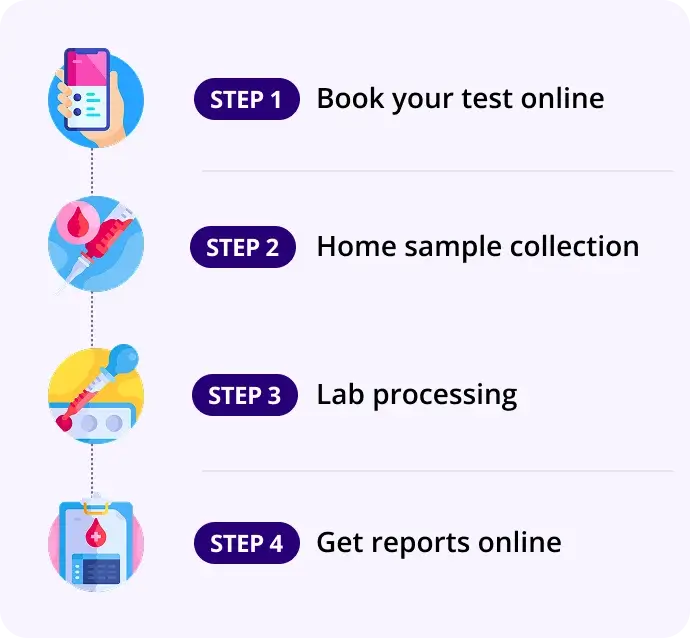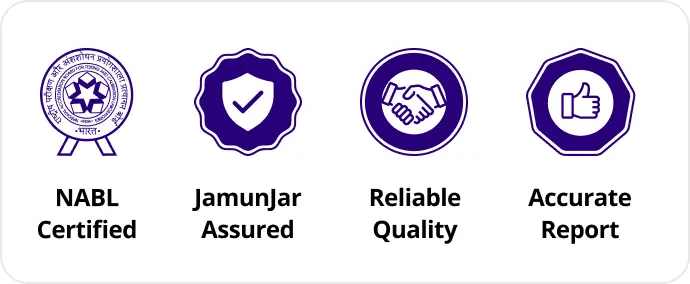Search for
Urine Sugar (Fasting)
Diabetes
Report in 4Hrs
At Home
Fasting Required
Details
Measures blood sugar levels to diagnose diabetes
₹39₹70
44% OFF
FREE:
Ai Insights
Urine Sugar (Fasting) - Comprehensive Medical Test Guide
- Why is it done?
- Detects the presence of glucose in urine, which may indicate elevated blood sugar levels or metabolic disorders
- Screens for diabetes mellitus and prediabetic conditions, particularly in fasting state when glucose should be minimal
- Identifies kidney dysfunction or renal threshold abnormalities that allow glucose to spill into urine
- Performed during routine physical examinations and annual health screenings
- Ordered when patients present with symptoms such as increased thirst, frequent urination, unexplained weight loss, or fatigue
- Used to monitor patients with known diabetes or those at high risk due to family history or obesity
- Typically performed in the morning after overnight fasting to establish baseline glucose excretion patterns
- Normal Range
- Normal Result: Negative or Trace amounts (less than 100 mg/dL or <5.6 mmol/L)
- Measurement Units: mg/dL (milligrams per deciliter) or mmol/L (millimoles per liter)
- Negative Result: No glucose detected in urine; indicates normal renal function and adequate glycemic control
- Trace Amount: Minimal glucose (typically 50-100 mg/dL); may be considered borderline and requires monitoring
- Positive Result: Greater than 100 mg/dL (>5.6 mmol/L); abnormal and warrants further investigation and clinical evaluation
- Interpretation Grading: Results often reported qualitatively as Negative, Trace (±), 1+ (100-250 mg/dL), 2+ (250-500 mg/dL), 3+ (500-1000 mg/dL), or 4+ (>1000 mg/dL)
- Interpretation
- Negative Result: Indicates normal glucose metabolism, healthy kidney function, and blood glucose within acceptable fasting range
- Trace/Borderline Results: Suggest blood glucose is near renal threshold; recommend repeat testing and correlation with fasting blood glucose measurements
- 1+ to 2+ Results: May indicate uncontrolled diabetes, new-onset diabetes mellitus, or poor glycemic management; requires immediate evaluation
- 3+ to 4+ Results: Highly abnormal; indicates severe hyperglycemia, possible diabetic ketoacidosis, or critical kidney involvement; urgent medical attention needed
- Factors Affecting Results: Blood glucose levels, kidney function, medications (corticosteroids, diuretics), stress, recent infection, pregnancy, or reduced renal glucose threshold
- Clinical Significance - Positive Findings: May indicate type 1 or type 2 diabetes, gestational diabetes, pancreatic disease, thyroid disorders, renal tubular dysfunction, or metabolic syndromes
- False Positives/Negatives: Contamination with reducing substances, improper specimen collection, or delayed analysis may cause false results; always correlate with serum glucose measurements
- Associated Organs
- Primary Organ Systems: Endocrine system (pancreas), urinary system (kidneys and bladder), and metabolic pathways
- Kidneys: Filter blood and reabsorb glucose; abnormal glucose in urine indicates either high blood glucose or impaired renal reabsorption
- Pancreas: Produces insulin which regulates blood glucose levels; dysfunction leads to hyperglycemia and glucose spillage into urine
- Associated Conditions - Diabetes Mellitus: Type 1 (autoimmune destruction of beta cells), Type 2 (insulin resistance and relative insufficiency), gestational diabetes, and secondary diabetes from other disorders
- Associated Conditions - Kidney Disorders: Diabetic nephropathy, renal tubular dysfunction, chronic kidney disease, glomerulonephritis, and Fanconi syndrome
- Associated Metabolic Disorders: Metabolic syndrome, obesity, dyslipidemia, thyroid disorders, polycystic ovary syndrome (PCOS), and hormonal imbalances
- Complications Associated with Abnormal Results: Progressive hyperglycemia can lead to microvascular complications (retinopathy, neuropathy, nephropathy) and macrovascular events (coronary artery disease, stroke)
- Acute Complications: Diabetic ketoacidosis (DKA), hyperglycemic hyperosmolar state (HHS), and severe infections
- Follow-up Tests
- Fasting Blood Glucose (FBG): Measures serum glucose after 8-hour fasting; essential confirmatory test (<100 mg/dL normal, 100-125 mg/dL prediabetic, >126 mg/dL diabetic)
- Hemoglobin A1C (HbA1c): Reflects average blood glucose over 2-3 months; diagnostic and monitoring tool for diabetes (<5.7% normal, 5.7-6.4% prediabetic, ≥6.5% diabetic)
- Oral Glucose Tolerance Test (OGTT): Evaluates glucose response after consuming glucose solution; diagnoses impaired glucose tolerance and gestational diabetes
- Comprehensive Metabolic Panel (CMP): Includes glucose, electrolytes, kidney function, and liver function tests; assesses overall metabolic status and complications
- Urinalysis with Microscopy: Evaluates for other abnormalities, protein presence (indicating kidney disease), and signs of urinary tract infection
- Kidney Function Tests (Creatinine and eGFR): Assess renal function and detect diabetic nephropathy; monitor for chronic kidney disease progression
- Urine Microalbumin/Protein: Detects early signs of kidney damage from diabetes; performed annually in diabetic patients
- C-Peptide Level: Assesses pancreatic beta cell function; helps differentiate type 1 from type 2 diabetes
- Lipid Panel: Evaluates cholesterol and triglycerides; identifies cardiovascular risk factors associated with diabetes
- Blood Pressure Monitoring: Regular monitoring necessary as hypertension is common in diabetic patients and increases cardiovascular risk
- Monitoring Frequency: HbA1c every 3 months for diabetics with poor control, every 6 months with good control; annual screening for at-risk individuals
- Fasting Required?
- Fasting Requirement: YES - Fasting is recommended but not always strictly required for urine sugar testing alone; however, it is essential when fasting blood glucose is simultaneously ordered
- Fasting Duration: 8-12 hours of overnight fasting is standard; this establishes baseline glucose levels and ensures accurate results unaffected by recent food consumption
- Water Intake: Water consumption is allowed and encouraged during the fasting period to ensure adequate hydration and urine production
- Foods to Avoid: No food, beverages containing sugar or caffeine, fruit juices, milk, or sweetened drinks; only water permitted during fasting period
- Medications: Continue routine medications as prescribed unless specifically instructed otherwise by healthcare provider; certain medications may affect glucose levels and should be noted
- Medications to Discuss: Corticosteroids, thiazide diuretics, beta-blockers, oral contraceptives, and psychiatric medications may increase blood glucose and should be disclosed
- Specimen Collection Instructions: Collect first morning void (most concentrated urine); use clean-catch midstream technique in sterile container to prevent contamination
- Timing of Collection: Obtain specimen in early morning after overnight fasting for most accurate baseline results
- Additional Preparation: Avoid strenuous exercise, stress, and illness during fasting period; these factors can elevate glucose levels; inform provider of any recent infections or medical events
- Specimen Handling: Urine should be analyzed within 2 hours of collection or refrigerated if delay is expected; avoid bacterial overgrowth which can consume glucose
How our test process works!

